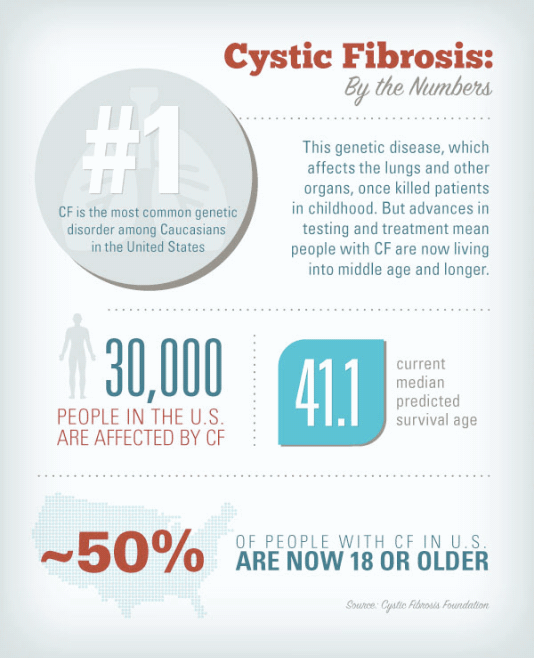For Sigrid Ladores, Ph.D., a pediatric nurse practitioner and an Assistant Professor at the University of Alabama at Birmingham School of Nursing, investigating reproductive health concerns of adolescents and young adults living with chronic illnesses, in particular cystic fibrosis, is more than a professional research focus, but also a personal passion.
Dr. Ladores’s husband, Andrew, 42, struggles with CF daily, providing her with a unique perspective from which to approach researching the disease as a scientist, as well a caregiver for a spouse with CF.
“It is very personal for me,” Dr. Ladores told University of Alabama at Birmingham Media Relations Manager Tyler Greer. “I am really invested in this, not just from the professional side of things, but because Im also personally connected to it.”
It was her personal connections with her family and the CF community that led Dr. Ladores to her current project, a study of women’s’ basic knowledge of fertility, effects of CF on fertility among women of childbearing age who have CF and the potential impact a recently approved drug, Orkambi, may have on fertility rates among those women. Women account for 48 percent of the CF population.
Vertex’s Orkambi (lumacaftor 200 mg/ivacaftor 125 mg) was newly FDA-approved in July for treating CF in patients 12 years of age and older who have the F508del mutation, and is being hailed by the CF community as a potential game changer in CF therapy because it addresses the underlying genetic cause of CF, and not just the symptoms.
Having two copies of the F508del mutation is the leading cause of CF — a heritable autosomal recessive genetic disease that for decades was considered primarily a childhood malady because few who suffered from it lived much past childhood. However, significant advances in research, genetic testing, therapeutics, comprehensive clinical care and more effective drugs such as ivacaftor, which was approved in 2012, and now Orkambi or its generic ivacaftor/lumacaftor combo, have resulted in half the U.S. CF population now being 18 years of age or older, and the median predicted survival age for persons with CF having climbed to 41.1, with some living into their 50s.
“With advances in our personalized medicines such as this targeted new targeted CF genetic drug, we’re seeing about 50 percent of the people with CF who now are adults which is amazing,” Dr. Ladores observes, noting: “I personally know many people with CF in their 50s who are living full, healthy lives. We’ve got great medicines that address those issues, and now we have adults who want to engage in all developmental milestones, and that includes parenthood.”
In a growing number of cases, women with CF who didn’t plan on being parents are finding themselves dealing with unexpected pregnancies. Dr. Ladores and her research colleague doctoral student Leigh Ann Bray want to examine how Orkambi may improve life expectancies for CF patients, particularly women with CF who are experiencing unplanned pregnancies.
According to the Cystic Fibrosis Foundation, more than 10 million Americans — one out of every 31 — carry the defective F508del gene, and CF is the most common genetic disorder among Caucasians in the United States, affecting approximately 30,000 people in the United States and 70,000 worldwide. According to Cystic Fibrosis Foundation and UK CF Registry, approximately half of the respective populations of people with cystic fibrosis in both the US and the UK have two copies of the F508del mutation, numbering an estimated 8,500 people in the U.S.
The defective genes cause production of an abnormal protein that disrupts the body’s water and chloride transport functions — especially in the lungs and digestive tract, resulting in impeded passage of salt and water into and out of cells, resulting in little to no CFTR protein at the cell surface and causing thick, sticky mucus to develop inside the body that can cause chronic lung infections and producing very salty perspiration as well as other severe respiratory and digestive problems, and a risk factor for complications such as other infections and diabetes, and causing progressive lung damage.
While the disease primarily regarded as being associated with the lungs and lung function, it also affects the pancreas and other organs, and can lead to gastrointestinal, ear, nose and throat, muscular skeletal, and cardiac issues. For the women of childbearing age, add reproductive health issues.
With a Faculty Development Grant funded by the UAB Provost’s Office, Dr. Ladores and Ms. Bray are conducting their study, entitled “Female Fertility in the Age of New CFTR-Modulating Drugs,” in hope of acquiring information that may help provide a roadmap to more comprehensive care related to reproductive health of women with CF.
The study will focus on 10 women who have CF and a control group of 10 who do not. The women with CF will be asked to complete a demographics form and two surveys; one to determine their general knowledge of fertility, and the other on the effects of CF on fertility. The women without CF will be asked to complete a demographics form and a questionnaire on their general knowledge of fertility, and their responses will be compared to those of the 10 women with CF.
“I want to see what these women know about fertility versus what the women without CF know about fertility concepts,” Dr. Ladores told UAB’s Greer, who reports that while precise data on CF female fertility rates are unknown, the CFF Patient Registry indicates that the number of women with CF who have become pregnant has doubled in just over 20 years, from 116 reported pregnancies in 1992 to 249 in 2012. With life expectancies continuing to improve, that number is an anticipated to continue to rising exponentially.
Greer points to the heart of the issue being a perception held by many women with CF that they are infertile simply because they have the disease, and while most men with CF (almost 99 percent according to Dr. Ladores), are born sterile, the infertility issue for women with CF is that their cervical mucus is excessively thick, analogical to the mucus that plugs their lungs and GI system.
Consequently, many women with CF don’t practice contraception simply because they are unaware there is actual potential for them to conceive. In the UAB feature, Dr. Ladores cites a study released in the summer of 2015 by a group of researchers at her alma mater, the University Pennsylvania, and presented to the American Congress of Obstetricians and Gynecologists. The paper found that fewer than 50 percent of women with CF use birth control because most believe it’s unnecessary to do so.
“Compare that with the average non-CF women in this country where 65 percent of them do use some kind of birth control,” Dr. Ladores says. “The thinking of these women is Im not going to get pregnant anyway so why do I have to use it? So we’re seeing more and more of these women getting pregnant because they are not using barriers,” and further complicating the dynamic, she observes that “This new drug, Orkambi, can interfere with how effective their birth control pills can be and potentially improve their fertility. It can be double trouble.”
Beginning in 2012, the year ivacaftor received FDA approval, Dr. Ladores says she first began hearing reports from the CF community of women with CF who had taken the drug and found themselves facing the challenge of an unexpected, unplanned pregnancy, and the laments of women facing those high-risk pregnancies who said, “I wish someone had told me that this drug could make me more fertile” — circumstances Dr. Ladores and Ms. Bray hope to help alleviate in the future through their research.
“It is so new for many of them to live this long that all this knowledge is new,” Ms. Bray, who worked with younger CF patients during a year spent as a bedside nurse in the Pulmonary Clinic at Children’s of Alabama, told UAB’s Greer. “It is uncharted territory in a way,” and why she is so excited to be mentored by someone like Dr. Ladores, who understands the CF world from a wide range of perspectives. “She goes to the same clinic with her husband that we go to do research [and] every time we interview a participant, she can tell them she understands what they are going through from a different perspective for sure. She knows more what their everyday lives are like, and it works really well.”
Dr. Ladores relates that very early in their relationship, she and her husband knew they wanted to be parents and despite the anticipated hardships, they were determined to try. She had a chromosomal analysis done to determine that she did not carry the CF gene, after which the couple underwent an expensive round of five in vitro fertilization treatments.on the fifth of which a frozen embryo survived to become a witty, funny, caring 7-year-old named Asher who knows his father had a lifesaving lung transplant in 2011, and every year on April 21 celebrates “Popsicle Day” because that’s the day he came out of the freezer.
Asher does carry the CF gene, which Dr. Ladores says will require a conversation when he is older; but after being blessed with one child, the Ladoreses embarked on another seven rounds of fertility treatments, and await the arrival of their second child very soon.
“We are just beyond blessed because we know that there are many couples out there who, despite thousands and thousands of dollars they’ve invested in fertility treatments and years of waiting for that baby, the day never comes,” Sigrid Ladores tells Greer. “So there is a personal connection in this for me because I want to help them any way I can.” (Images courtesy University of Alabama at Birmingham).
Sources:
University of Alabama at Birmingham
Vertex
The Cystic Fibrosis Foundation
UK CF Registry


